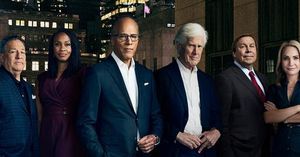In a courtroom setting that has the fast food world buzzing, the origins of one of America’s favorite snacks—Flamin’ Hot Cheetos—are under scrutiny. This spicy legal saga stems from allegations of fraud and defamation against the snack giant, PepsiCo. The central figure in this conflict is Richard Montañez, a former employee who claims he is the original inventor of the snack that has charmed taste buds since the 1990s.
Montañez's journey with PepsiCo is a fascinating story of ambition. Originally starting his career as a janitor at the Frito-Lay plant in California in 1977, Montañez worked his way up to an executive position. His claim to fame—or infamy, depending on the outcome of this case—comes from his assertion that he invented Flamin' Hot Cheetos. According to Montañez, the idea sparked in his mind as he began experimenting with chili powder and Cheetos during the early 1990s. His creativity supposedly led him to pitch the idea to the company, transforming a humble snack into an explosive blockbuster that would go on to become a cultural phenomenon.
However, troubles arose for Montañez later in his career when PepsiCo disavowed his claims, attributing the Flamin’ Hot phenomenon to other employees. This resulted in a downward spiral for Montañez, who feels his reputation and career were severely damaged by the company’s refusal to acknowledge his supposed role in creating the wildly popular snack. He feels particularly aggrieved that his subsequent efforts to promote the snack were neither recognized nor rewarded by the company.
"Even after I helped make this product a success for the company, I was cast aside, and my contributions were erased," Montañez said in frustration. The disavowal has not only caused him psychological distress but has also affected his financial stability, motivating his legal pursuit for what he believes is justice.
The lawsuit highlights a much deeper issue than just snack origins; it also underscores the significance of recognition in the fast-paced world of corporate America. For many people working behind the scenes, the need for acknowledgment can often feel elusive, and Montañez's struggle shines a spotlight on how corporate culture can overlook the contributions of its lower-tier employees. In an age where storytelling and the origin of products play vital roles in marketing, the importance of the individual stories behind creations cannot be overstated.
In defense, PepsiCo’s response has been to deny Montañez’s claims, asserting that he did not create the Flamin’ Hot Cheetos as he alleges. Their legal team argues the product was developed by a team of chefs and engineers who saw a market opportunity and responded accordingly. According to PepsiCo, attributing the product's success to any single individual would risk misrepresenting the collaborative nature of product development in large corporations.
A spokesperson for PepsiCo pointedly stated, “Innovation at Frito-Lay has always been a team effort, and many contributors deserve credit for their work.” This statement aims to emphasize that while Montañez played a role in marketing the product, the origin story involves a larger group than one individual, undermining Montañez’s claims.
Conflict arose not only over who was responsible for the creation of Flamin' Hot Cheetos but also the narrative that surrounds the snack. In a 2021 memoir, Montañez detailed his experiences and reiterated his belief that he was the mastermind behind the product. His version of events has since been celebrated in various media, including a documentary that chronicles his rise from janitor to executive. This has added layers to his legal battle, transforming it into not just a dispute over snack origins but also a gripping tale of fighting for recognition in a world that often marginalizes individual achievement.
The case has also attracted attention due to its potential ramifications for how companies acknowledge contributions from employees at all levels. Legal experts speculate that if Montañez's claims hold up in court, it could set a new precedent for how companies might need to navigate ownership of intellectual properties in their operations.
PepsiCo's lawyers are working hard to dismiss Montañez's allegations, pressing for a swift conclusion to the case, likely to alleviate potential public relations fallout. Meanwhile, the story continues to unfold, capturing the interest of not just snack lovers but also corporate employees seeking validation in their daily work. The attention on this case raises questions about the ethical implications of how large corporations treat their employees' contributions.
As legal arguments bound to the courtroom, social media has seized upon the drama, creating a flurry of public opinion on the matter. Many users on Twitter and other platforms have voiced their support for Montañez, calling for a more transparent acknowledgment of contributions in businesses. Memes, tweets, and public comments have inundated the digital landscape, reflecting a wider societal push for recognizing unsung heroes.
This case encapsulates much more than a simple product recall. It delves deep into corporate culture, personal narratives, and the perceived erosion of individual effort within corporate structures. With ample media coverage, the story of Flamin’ Hot Cheetos is layered with the complexities surrounding consumer culture, immigration narratives, and the challenge of climbing the corporate ladder as a person of color.
No matter the outcome, this courtroom drama stands to illustrate the ongoing debates in America surrounding merit, recognition, and the stories we tell ourselves about success and creativity.



